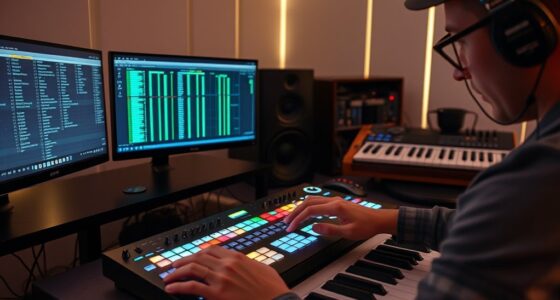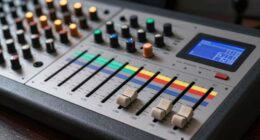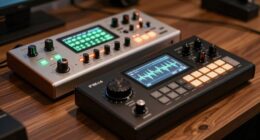To turn your musical vision into trackable KPIs, start by clearly defining your aspirations and what success looks like for you. Then, set SMART goals—specific, measurable, achievable, relevant, and time-bound—that break down larger dreams into manageable steps. Track your progress using KPIs like social media engagement, streaming numbers, or live show attendance. Regularly adjust your goals based on these insights to stay motivated and focused. Keep exploring these strategies to discover your full potential.
Key Takeaways
- Define clear, specific musical goals aligned with your overall vision to facilitate focused tracking.
- Identify relevant KPIs such as streaming numbers, social media engagement, and live attendance to measure progress.
- Break down large objectives into measurable, actionable steps with set deadlines for easier monitoring.
- Regularly review and adjust KPIs based on performance data and industry trends to stay aligned with your goals.
- Use KPIs as feedback tools to refine strategies, boost motivation, and ensure continuous growth toward your musical aspirations.
Defining Your Musical Aspirations Clearly

To effectively set goals, you first need to define your musical aspirations with clarity. Visualize your ideal sound and career path through creative visualization, imagining yourself performing, recording, or collaborating. This mental picture helps sharpen your focus and motivates you to pursue specific achievements. Consider exploring different genres to discover what truly excites you; genre exploration can reveal new influences and inspire fresh ideas. Be specific about what success looks like—whether it’s releasing an album, performing at festivals, or building a dedicated fan base. Clarifying these aspirations guides your efforts and makes your goals more tangible. When your vision is clear, it becomes easier to develop actionable steps and stay committed to your musical journey. Understanding goal-setting strategies can further enhance your ability to turn your vision into measurable progress.
Identifying Key Performance Indicators for Musicians

Understanding and tracking your Key Performance Indicators (KPIs) is essential for measuring your progress and staying focused on your musical goals. KPIs help you evaluate how well you’re engaging your audience and maintaining brand consistency. To identify effective KPIs, consider metrics like social media engagement, streaming numbers, and attendance at live shows. These indicators reveal whether your efforts resonate with your audience and support your brand image. Use the table below to visualize some common KPIs:
| KPI | Purpose |
|---|---|
| Audience engagement | Measures interaction and interest |
| Streaming & sales | Tracks content popularity |
| Social media growth | Indicates brand reach |
| Live show attendance | Reflects audience loyalty |
Choosing the right KPIs that align with your specific goals can also help you maximize space and organization in your approach, ensuring you stay on track and adapt strategies as needed.
Setting SMART Goals to Drive Progress

Ever wondered how to turn your musical ambitions into achievable steps? Setting SMART goals—Specific, Measurable, Achievable, Relevant, and Time-bound—helps you do just that. Incorporate creative exercises into your plan to develop new skills and keep your progress on track. For example, set a goal to complete a certain number of improvisation sessions each week. Strengthen your networking strategies by aiming to connect with a specific number of industry contacts within a set timeframe. These targeted objectives give you clear directions and motivate you to stay consistent. By aligning your creative exercises and networking efforts with SMART criteria, you’ll transform vague intentions into concrete steps, making steady progress toward your musical dreams. Additionally, exploring different camping environments can inspire creativity and provide fresh perspectives outside of your usual routine.
Breaking Down Large Goals Into Manageable Tasks
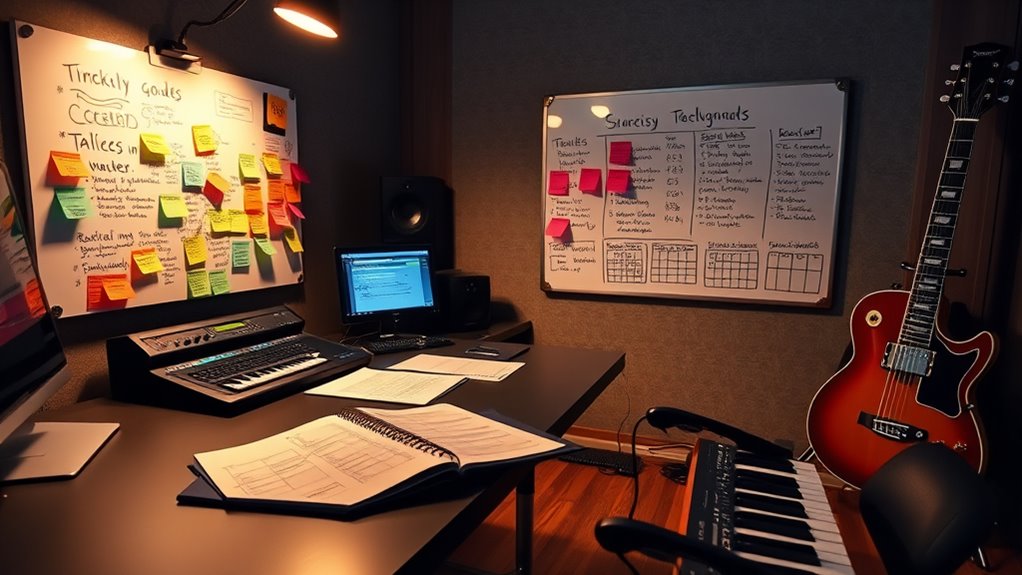
To make big goals feel more achievable, you need to define clear milestones that mark your progress. Prioritizing actionable steps helps you stay focused and avoid feeling overwhelmed. By breaking tasks into manageable pieces, you can steadily move closer to your ultimate goal without losing momentum. Incorporating well-being tips into your routine can support sustained motivation and resilience throughout your journey.
Define Milestones Clearly
Breaking down a large goal into smaller, specific milestones makes it easier to track progress and stay motivated. Clear milestones help you measure success and keep your focus sharp. For example:
- Master basic music theory concepts to improve your composition skills.
- Complete a set of practice sessions focused on audience engagement techniques.
- Record a demo that reflects your understanding of musical dynamics.
- Share your work with a small audience to gather feedback.
These milestones clarify what needs to be accomplished and prevent overwhelm. By defining specific, measurable steps, you ensure each achievement moves you closer to your overall goal. Make certain each milestone relates directly to your larger vision, whether it’s enhancing your music theory knowledge or connecting with listeners more effectively. Incorporating trackable KPIs into your goal-setting process can help you objectively assess your progress over time.
Prioritize Actionable Steps
When working toward a large musical goal, it’s essential to identify and focus on actionable steps that make progress manageable. Break your big objectives, like enhancing audience engagement or building musical collaboration, into smaller tasks. For example, schedule weekly practice sessions, reach out to potential collaborators, or plan social media content. Prioritizing these steps keeps you focused and motivated. It also helps you track progress and adjust as needed. By tackling manageable tasks, you avoid feeling overwhelmed and ensure steady momentum. Remember, consistent effort in small, actionable steps leads to bigger achievements. Incorporating visual inspiration can help maintain motivation and clarify your path forward. Whether refining your craft or expanding your audience, breaking goals down makes the journey more achievable and rewarding.
Tracking and Measuring Your Musical Growth
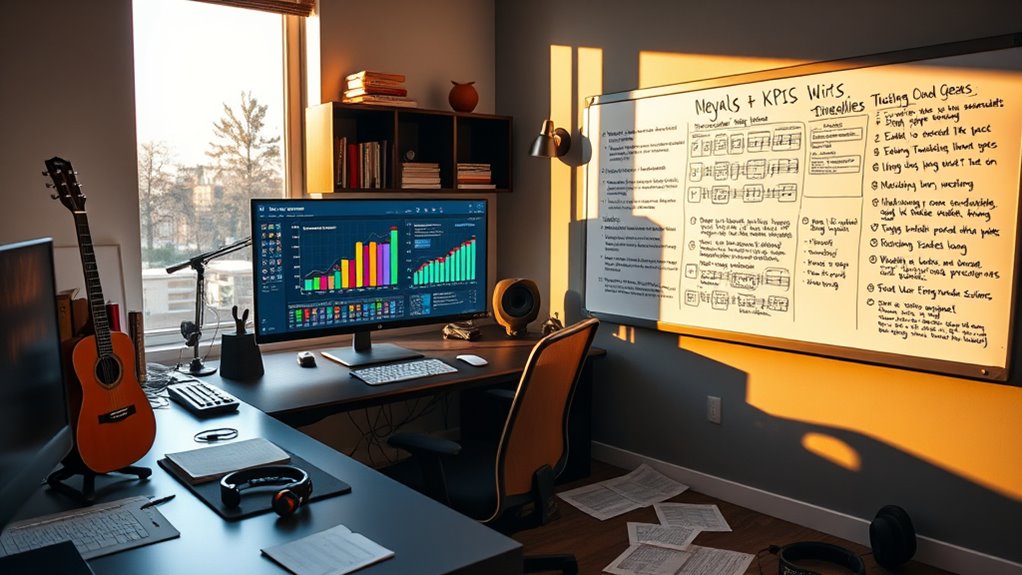
Recognizing and reflecting on shared experiences with mentors or loved ones can boost motivation and deepen your connection to your musical journey.
Adjusting Goals Based on Performance Data

Analyzing your performance data allows you to identify areas where you’re excelling and pinpoint aspects that need improvement. By examining metrics related to audience engagement and current music industry trends, you can see which strategies resonate most. If your streams or social media interactions decline, it’s a sign to adjust your goals and tactics. Perhaps your content isn’t aligning with audience preferences or industry shifts, so refining your approach becomes necessary. Regularly updating your KPIs based on these insights guarantees your goals remain relevant and achievable. Flexibility is key—adapting your objectives in response to performance data helps you stay competitive and connected with your audience. This ongoing process keeps your growth aligned with industry dynamics and audience expectations. Incorporating ethical considerations into your analysis ensures your strategies promote authenticity and trust with your listeners.
Celebrating Achievements and Staying Motivated

Celebrating your achievements is essential for maintaining motivation and reinforcing your progress as a musician. Recognizing milestones boosts your confidence and encourages continued effort in the competitive music industry. To keep your fan engagement strong, consider these strategies:
- Share your wins on social media to showcase your growth and connect with your audience.
- Host small events or live sessions celebrating milestones, fostering a sense of community.
- Thank fans directly for their support, reinforcing their engagement.
- Reflect on your achievements regularly, setting new goals based on your progress.
- Incorporate moments of spiritual fulfillment into your celebrations to deepen your sense of purpose and connection.
Celebrating your successes not only fuels motivation but also strengthens your reputation within the music industry. It reminds you that every step forward is valuable, inspiring continued pursuit of your musical vision.
Frequently Asked Questions
How Can I Stay Flexible With My Goals During Unexpected Setbacks?
When facing unexpected setbacks, you need to embrace mindset flexibility and develop setback strategies. Stay adaptable by revisiting your goals and adjusting timelines or priorities as needed. Focus on what’s within your control and view obstacles as opportunities to learn. Regularly reassess your progress, remain open to change, and keep a positive outlook. This proactive approach helps you stay motivated and resilient, turning setbacks into valuable growth experiences.
What Tools Best Help Musicians Track Their KPIS Effectively?
When tracking your progress metrics, digital tools are your best allies. They help you monitor your achievements, set reminders, and analyze growth patterns. Tools like spreadsheets, project management apps, and dedicated music analytics platforms make it easier to stay organized, identify trends, and adjust your strategies. By using these tools consistently, you turn your ambitions into measurable actions, ensuring your musical journey stays focused, adaptable, and ultimately successful.
How Often Should I Review and Adjust My Musical Goals?
You should review and adjust your musical goals regularly, ideally every month or quarter. This keeps your creative routines fresh and aligned with your progress. As you evaluate, consider your networking strategies and how they’re influencing your growth. If certain goals feel too easy or hard, tweak them to stay motivated. Consistent check-ins help you stay focused, adapt to challenges, and turn your vision into actionable, trackable steps.
Can Goal-Setting Improve Creativity Alongside Measurable Results?
Imagine your creativity as a vast, open sky. Goal-setting acts like a steady compass, guiding your artistic growth without confining your creative freedom. By setting clear, measurable goals, you channel your energy efficiently, inspiring new ideas and pushing boundaries. This balance between structure and freedom fuels innovation, making your artistic journey more intentional and rewarding. With goals, you nurture both your creative spirit and tangible results.
How Do I Balance Short-Term Achievements With Long-Term Vision?
Balancing short-term achievements with your long-term vision keeps you motivated and focused. You can do this by setting immediate goals like increasing audience engagement or creating new musical inspiration, while also aligning those tasks with your bigger dreams. Track your progress regularly, adjusting as needed. This approach helps you stay inspired, connect with your audience, and steadily move toward your ultimate musical vision.
Conclusion
As you set your musical goals and track your progress, you’ll notice how clarity and persistence align, turning dreams into tangible steps. Celebrate small wins, stay flexible, and let your passion guide each adjustment. When your efforts and milestones sync naturally, motivation flows effortlessly. Remember, every note you hit and goal you achieve weaves into your unique journey, proving that with focus and dedication, your musical vision becomes a vibrant reality—one step at a time.





